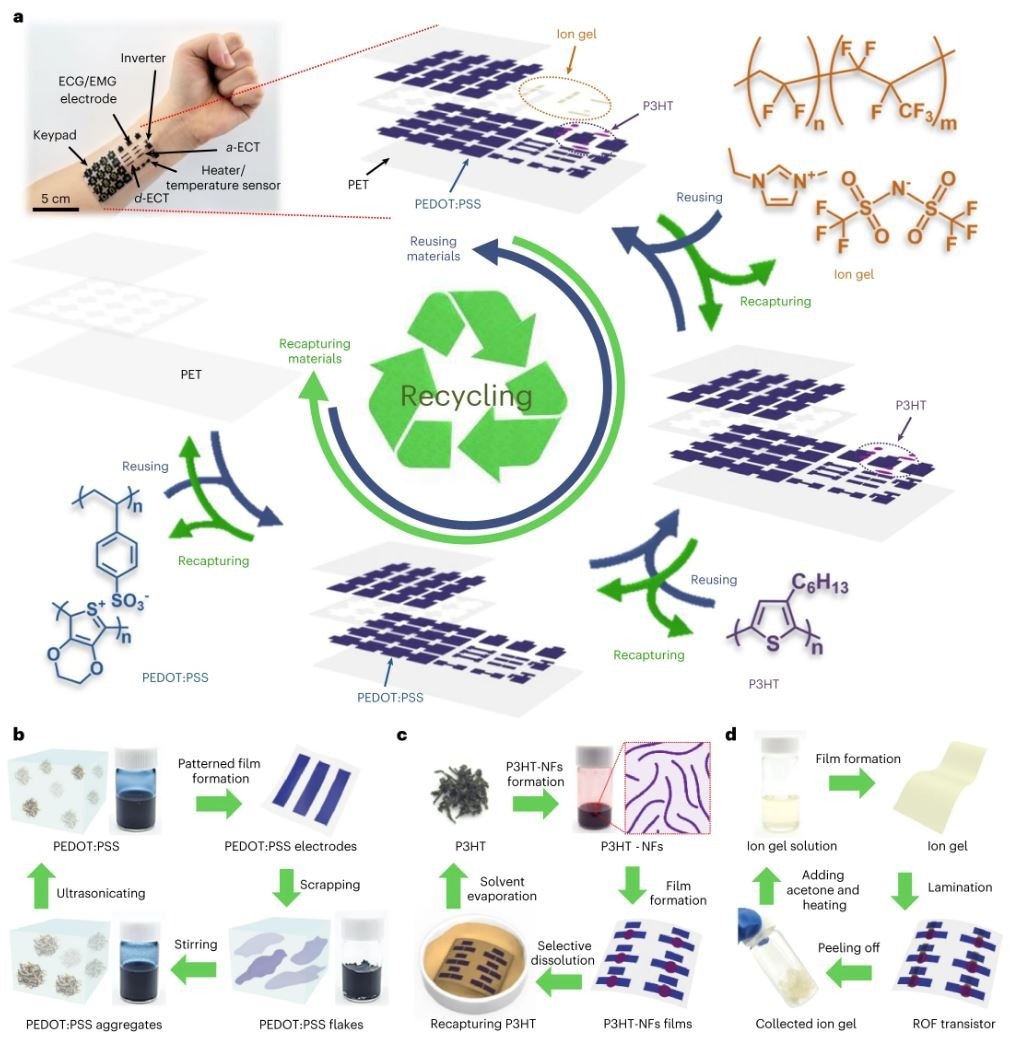A research team from UNIST’s Department of Chemistry, under the direction of Professor Kyoseung Sim, has made significant progress in creating sustainable wearable technology. Their innovative technique addresses environmental issues and opens the door for a sustainable future in the electronic device sector by enabling closed-loop recycling of organic electronic components.
 Schematic illustration of the recyclable organic flexible (ROF) electronics and recycling process. (a) Overall concept of wearable ROF electronics, (b) Recycling process of PEDOT:PSS electrodes, (c) Recycling process of P3HT semiconductor. d, Recycling process of ion gel. Image Credit: Ulsan National Institute of Science & Technology
Schematic illustration of the recyclable organic flexible (ROF) electronics and recycling process. (a) Overall concept of wearable ROF electronics, (b) Recycling process of PEDOT:PSS electrodes, (c) Recycling process of P3HT semiconductor. d, Recycling process of ion gel. Image Credit: Ulsan National Institute of Science & Technology
Organic electronic material production has historically been linked with hazardous solvents, poisonous byproducts, and high environmental and economic consequences. On the other hand, this innovative study has unlocked the possibility of recycling and repurposing organic conductors, semiconductors, and gate dielectrics in an environmentally responsible and economically sustainable way.
The study team’s closed-loop recycling method uses solvents that are environmentally friendly—like water, anisole, and acetone—in both the manufacture and recycling stages. This discovery is a major step towards sustainable manufacturing and recycling processes for organic flexible electronic devices, as it eliminates the need for toxic ingredients.
The group effectively produced a variety of recyclable organic flexible electronic devices, such as keypads, electrochemical transistors, heaters/temperature sensors, electrophysiological sensing electrodes, and inverters, to showcase the potential of this methodology.
Furthermore, they created a sustainable device cycle by reassembling a variety of organic flexible electronics with recycled components from various working devices, all without the need for new resources.
Extensive analyses of the organic electronic materials’ recyclability have produced impressive findings. Organic semiconductors exhibited a recycling potential of about one cycle, organic insulating gels could be reused over thirty times, and organic conductors could be recycled more than five times.
This study offers the first solution to the environmental challenges posed by the use of organic electronic materials in the electronics industry. The outcomes of this research are expected to be a pivotal milestone and a key technology that shapes the future of sustainable electronic devices.
Kyoseung Sim, Professor, Department of Chemistry, Ulsan National Institute of Science & Technology
On December 16th, 2023, the study—of which Haechan Park was the first author—was posted online by Nature Electronics. The Ministry of Science and ICT (MSIT), UNIST, and the National Research Foundation of Korea (NRF) all provided funding for the study.
Journal Reference:
Park, H., et. al. (2023) Organic flexible electronics with closed-loop recycling for sustainable wearable technology. Nature Electronics. doi:10.1038/s41928-023-01078-9